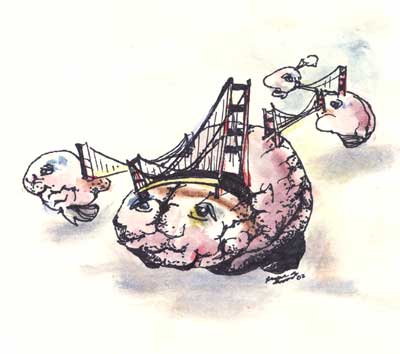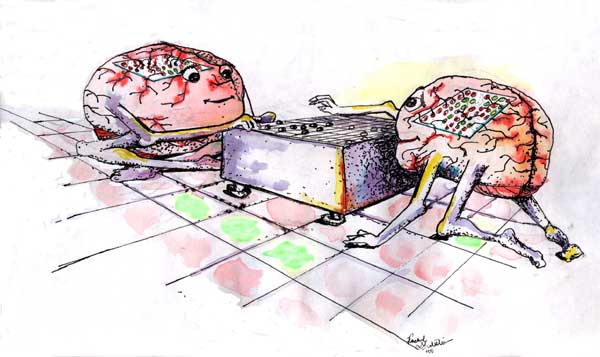Serendip is an independent site partnering with faculty at multiple colleges and universities around the world. Happy exploring!
On the Usefulness of Bipartiteness
Towards Day 23 of Evolving Systems course

I. coursekeeping
* no papers or writing conferences due this week!
* please enjoy your Thanksgiving holiday!!
* for next Tuesday, please do your last assigned reading (!), Jonathan Haidt's "The Emotional Dog and its Rational Tail: A Social Intuitionist Approach to Moral Judgement." Psychological Review 2001, 108, 814-834 -- (to access this essay, go to Haidt's webpage @ http://people.virginia.edu/~jdh6n/ and request the article; it will be e-mailed to you)
* also next Tuesday I'll review all the end-of-semester requirements: your performances, final papers, and portfolios
* next Thursday we'll share reflections on the semester's evolution (part of the time in company w/ Jane McAuliffe)
* next Friday your next paper will be due, reflecting some more on the implications of the concept of the bipartite brain
II. today
* reviewing two papers on the bipartite brain
* taking some time w/ two important postings:
Paige's "digression" about writing style
Aimee's "confession" about uncertainty
II. more forum comments about the usefulness of bi-partiteness:
Kirsten: example of optical illusions in art that I had discovered a while back.
Olivia: I found that some scientists think meditation is a way to change our brains. In class, we talked about how conversations can happen between consciousness and unconsciousness, and how the conversations changed our minds and behavior. I wonder which part of brain the meditation can change? The conscious part? The unconscious part? The physical brain? Or all of them? None of them?
I also tried to make connections between the "brains as story tellers" and other classes I take. But I found in math, what we found true must to be proved true. We can't make a story out of math. For example, the sum of three angles in a triangle is 180. The is not just a story told by my brain. I have to test it, prove it. And my brain, the story teller, has no control over it. Math and other science seem to get rid of the stories.
FluteSound4: Whoever knew how intelligent our unconscious was!...I proud of my unconscious .... It analyzes and looks our for my best interest without me even knowing. I just want to metaphorically pat it on the back now. Clearly we're not a complete slave to our unconscious. That's a good thing. I don't think I would like it very much if my unconscious was always making decisions for me and I wasn't able to tell it that sometimes it's actually wrong....I realized that I actually have mixed opinions about this topic. I like the mysteriousness of the unconscious, but I also like when we put reason behind the mystery. I think I just like a little mystery and a little reason in my life.
schu: In response to the re-wiring brain, well, there got to be advantanges and disadvantages... twitter ... Facebook, Youtube are the same drivers of floods of infomation. We can possibly learn many things from that with easy access, but as the information is too fragmentary, we tend to jump from one spot to another, and we tend to do multi-tasks at the same time. But doing homework, or reading books is a integrate task which requires long-time focus.... Computer games are quite different though. In my highschool, the very best students, esp. in science, are all great players of Warcraft, CS,FIFA, NBA live or even the minesweeper of windows. They tend to analysis games and try to win the games by developed strategies. Logic training is done partly in the practice of games .... they do very well in school work too. The games give them an alternate way to wire the brain
MC: Sometimes there are issues with talking with yourself. You talk to yourself but you don't really listen, or you can't listen, so that things that are chilling in one hemisphere of the brain can't make it to the other, or parts of the conscious don't make it to the unconscious, and a big wrench is thrown into the system. I suppose that it was beneficial for the brain to evolve into "pieces" so that if something happened to one part of the brain the entire thing didn't malfunction, but I would like to know more about how brains moved into the direction of hemispheres and areas and such.
Bingqing: In Thursday’s class, I guess most of us felt excited, curious but confused.... the fact that we handle informed guesses and have “smart unconsciousness” really interests me... I really appreciate the capability....I watched a video named The Secret Life of the Brain this weekend....Our brain can be divided into two parts...cortex and the part beneath cortex. The cortex controls our reasoning, understanding and judging. The large part beneath the furrows of cortex is our “unconscious underworld” which controls our appetites, emotion and moods. There is no properly working thinking without properly working emotion...Instead of being thinking machines, human beings are actually emotional machines. The world is constructed by our unconscious informed guess and human beings’ daily lives are also dominated by unconscious emotion.
Sounds Like Banana:In my psychology classes we always learnt about the unconcious as this scary, mysterious void where our deepest and darkest fears lay waiting to manifest themselves in our dreams or actions.... Freud saw the potential in the unconcious. He saw how the this void could actually be the home to his patients' dreams and fears, and by accessing these he could help them fufill their lifes' purpose or face their nightmares. This realization came to me as I was reasearching last week's paper.... By the end of the hour I was fully convinced that the unconcious was an untaped source of power, just waiting to be drilled for creativity. Yet I had to moderate my views to incorporate the importance of the concious too. Without which there would be less direction in the brain.
Lemon Koala: One point Paul made during his demonstration on Thursday is the constant conversation between consciousness and unconsciousness. Our unconsciousness tries to make up the missing pieces or the make the incomplete parts right with our existent concepts. Our unconsciousness is always trying to fix the incompleteness.
There are still a lot skepticisms for me about the conversations between consciousness and unconsciousness. For example... the scale or the level of our observation will affect our interpretation about the observation we make. Make it’s the perspective we look at the things rather than the conversations going on in the brain.
Aimee: My unconscious would remind me that I was afraid of the future - of the unknown. And it would remind me that I'm crazy by showing me the absurdity of my thoughts....My conscious brain tells me one story: "Stop focusing on your fears. Ignore, ignore, IGNORE!!!" (It doesn't work very well.) My unconscious brain tells me a different one: "You're afraid. Acknowledge it. Accept it."
Paul's lecture revealed that the unconscious brain just want to help the conscious interpret and understand sensory input. In a way, my dreams have revealed my brain's efforts, too. Perhaps you want to know if I still feel betrayed by my brain? Well, yeah... It would be really nice to know what I'm thinking.
nina44: Those optical illusions were crazy! It was weird to see it and be able to change certain aspects of it. It was like actually talking to your unconscious! I never really thought about the connection between the unconscious and the conscious. The more I think about it though the easier it is to see how they work together to help you. While by brain may not be perfect I no longer feel like it betrays me by not letting me know whats going on all the time. Somethings are better left to the unconscious so we don't have to think about things to hard. While those optival illusions made me sick for the rest of the day I found them to be very helpful in allowing me to make connections between the two parts of the brain.
paige: Last week’s discussions had me fixating on how much our brains (and our society) simplifies complex information and exaggerates differences in order to make functional understanding easier. We spoke about our bipartite brains (conscious versus unconscious) which are a simplified understanding of a very complex organ. Paul said the brain is trained to look for edges – stark contrasts. Our brain makes “informed guesses” based on experience and decides what is “important” information.
It’s all just so darn functional. It seems dangerous to me that our perception of reality is so simplified. I fear that binary is inherent in our makeup. This is bad to me because I feel that simplification, exaggeration and categorization cause the intense misunderstanding and ignorance that plagues the world today. And that misunderstanding and ignorance leads to conflict.
We categorize people into races, genders, ideologies. We categorize humanity as being separate from the earth and other flora and fauna because we see primarily our differences. We insist on political boundaries, simple man-made lines in the sand. I could go on and on. Once you start looking, simplification is everywhere.
The first things we see are differences. We are always talking about uniqueness rather than similarities (I myself am guilty of this charge). Sometimes this outlook has its benefits but right now I see the host of problems it can cause.
Probably, maybe, we need to simplify our reality to survive. At least in our perception as our brains create it – as in maybe I don’t need to be aware at all times of everything. Focus is good – it enables us to be productive. I just think that we should try to keep simplification to a minimum. We shouldn’t narrow our vision so much. Hopeful note: I feel, like Julie, that we have the ability to mold our brains and I know that we can shape society.
Qualifying statement.
Sarah: First thought that comes to mind when I ask myself about last week's class: oatmeal. I tapped into my subconscious... My brain felt like oatmeal after all those optical illusions. In fact, I'm pretty sure my brain wasn't sure whether it actually existed enough so that it could drip sadly out my ears like it felt like doing. Our subconscious brains are crazy, scary, wonderful things, and mine was pretty aware of itself after Thursday's class. I even remember feeling a physical sensation about my cranium as if my brain had just run a mile - like a tired muscle. I'm sure there's a lovely psychological explanation for that, because the brain doesn't contain nerve endings. That's another interesting facet of the brain and its consciousness. While the brain is the control and reception center for all of our physical sensations, it cannot feel anything itself.
Summer: Well, last week's discussion actually made me, errr, confused.... I like what the brains do with all those interesting pictures. I feel that we are seeing another world from a flat plane. I don't think that the brains are "cheating" or "lying" to us. The way our brains behave actually give us creativity!... Also, I got really disappointed and somehow desperate in class on Thursday because I really wanted to know what the "truth" really is. Especially with the rock. How I wished the rock could be in the classroom at that time so that I can touch it and see if it's a hollow or a bulge. So, now I'm confused.



